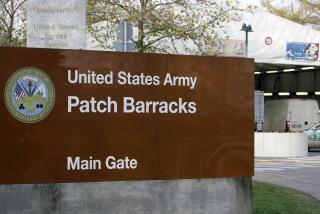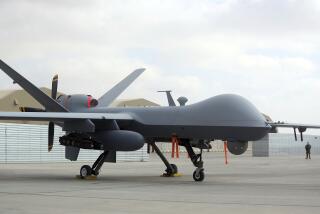U.S. Presses for Allied Threat to Counter Iraq : Persian Gulf: Officials hint that air bases might be destroyed if missiles are not removed from ‘no-fly zone.’
- Share via
WASHINGTON — Angered by Baghdad’s latest move to place more antiaircraft missiles in the “no-fly zone” in southern Iraq, the White House is pressing U.S. allies to join in threatening Iraq with military action if the missiles are not removed.
U.S. officials said Tuesday that Washington has begun consultations with Britain, France and Saudi Arabia in hopes of persuading them to issue a joint ultimatum, possibly as early as today.
Specifics of the allied threat were still being negotiated, but Washington clearly wants to allow Baghdad only a short time--possibly as little as 48 hours--before the military action would begin.
It was not immediately clear precisely what kind of military action the allies would take if Iraq refuses to move its surface-to-air missiles. But officials suggested that U.S. planes might destroy Iraqi air bases in retribution.
U.S. officials have become increasingly concerned about growing Iraqi violations of the no-fly zone, which the allies imposed last August under the authority of previous U.N. Security Council resolutions.
At first, the Iraqis confined their actions to occasional testing of the no-fly zone boundary, flying up to or slightly over the 32nd Parallel that marks its northern boundary and then retreating back to central Iraq.
On Dec. 27, two Iraqi MIG fighters penetrated the no-fly zone and confronted U.S. jets on patrol. The American aircraft fired, and one Iraqi fighter was shot down. The other escaped.
Until recently, U.S. authorities had dismissed the Iraqi violations, speculating that Baghdad was merely trying to test the resolve of the United States and its allies in the face of the Bosnian crisis and the U.S. election.
But this week U.S. officials reported that Iraq had set up new surface-to-air missiles in the no-fly zone--a step that Washington regards as a clear provocation.
A senior U.S. official said Tuesday that the Bush Administration believes a formal ultimatum is necessary because “the Iraqis still haven’t gotten the hint” that the allies mean business in enforcing the no-fly zone.
Presidential Press Secretary Marlin Fitzwater told reporters Tuesday that the Administration is “seriously concerned” over the latest Iraqi moves.
U.N. ambassadors from the major Western powers met briefly late Tuesday to discuss the no-fly proposal but apparently reached no agreement on language for the ultimatum.
U.S. officials said later that it is likely the allies will issue a firm warning on the Iraqi violations either sometime this week or early next week.
They said that no new U.N. resolution will be needed before the ultimatum because earlier measures passed by the Security Council provide sufficient authority. Iraq has charged that the allies had no right to impose the no-fly zone.
The United States has adequate air power in the Persian Gulf region to take on any enforcement missions. Besides Air Force planes based in Saudi Arabia, the Pentagon has about 90 Navy warplanes on aircraft carriers in the area.
U.S. officials said that Iraq’s refusal to abide by the no-fly restrictions is typical of the way Baghdad has responded to the allies’ demands since the Gulf War ended in March, 1991.
Iraqi President Saddam Hussein consistently has flouted U.N. resolutions on a wide variety of issues, ranging from weapons inspections procedures to refusing to participate in a commission to set new boundaries for Iraq.
In each case, he has given way somewhat in the end but only after pressing the allies as far as he could. In response, the allies have refused to ease trade sanctions imposed on Iraq.
There was no immediate indication whether Iraq actually plans to use the surface-to-air missiles to shoot at American planes or whether it merely is trying to be provocative, but U.S. officials said they are taking no chances.
The allies imposed a no-fly zone over northern Iraq in early 1991 to help protect the Kurdish population there from Iraqi bombardment. Baghdad generally has respected those restrictions but recently has blocked relief convoys there.
More to Read
Sign up for Essential California
The most important California stories and recommendations in your inbox every morning.
You may occasionally receive promotional content from the Los Angeles Times.













